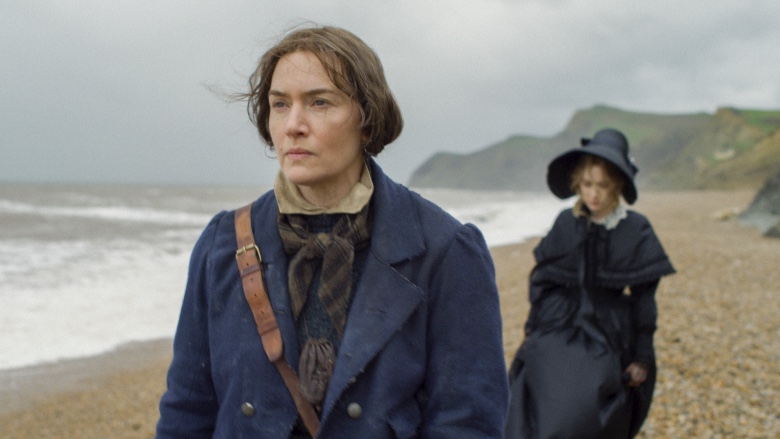Reviewed by GREG KING
Director: Francis Lee
Stars: Kate Winslet, Saoirse Ronan, Gemma Jones, James McCardle, Fiona Shaw, Alex Secareanu.

Love among the fossils?
Francis Lee follows up his acclaimed 2017 drama God’s Own Country with this tale of another same sex relationship, this time set in the 1800s and dealing with two repressed women from different backgrounds who fall in love. Ammonite is a critical look at class, status and gender roles in Victorian England, but Lee gives the material a subtle contemporary resonance.
Mary Anning (played by Kate Winslet) is a ground-breaking paleontologist who has established a formidable reputation in a male dominated field with her work in finding fossils and her meticulous work in preserving them and presenting them in museums. She was an important figure in this scientific discipline whose pioneering work helped bring a greater understanding about life in the prehistoric era. She lived a reclusive existence, operating from her small cottage on the coastline of Lyme Regis, which she shared with her aged mother Molly (veteran Gemma Jones, who appeared in Lee’s God’s Own Country). She sold souvenir fossils and trinkets to tourists while preserving her bigger fossil discoveries for museums. But we get plenty of glimpses into the work she does as she strolls along the windswept coastline digging up rocks.
She is approached by Roderick Murchison (James McArdle), an arrogant amateur geologist who was about to embark on a fossil hunting expedition in Europe. He wants to tap into her experiences and gain some knowledge, for which he is prepared to pay handsomely. His wife Charlotte (Saoirse Ronan) is sickly, suffering from melancholia following a recent miscarriage. He pays Mary to tend to her while he gallivants around the continent. The local doctor (Alec Secareanu, also from God’s Own Country) advises plenty of rest and suggests that she not move for a while. As Charlotte recovers, she begins to accompany Mary on her regular excursions along the shoreline looking for fossils. A friendship develops between the two women which becomes more intimate.
Ammonite is based on a true story – both Mary Anning and Charlotte are actual people – although Lee has undoubtedly taken liberties with the facts for dramatic purposes. The nature of the friendship between the pair is purely speculation on Lee’s part. Ammonite is a quiet reflective film but directed with sensitivity by Lee. The dialogue is sparse, but the two leads coney so much through tiny gestures and facial expressions than pages of dialogue could. Lee’s pacing is deliberately slow, which suits the introspective tone of the film.
The film is given a bleak, grey and chilling tone through the cinematography of Stephane Fontaine (Rust And Bone, etc) and the rather austere, grim settings and the windswept coastline. The period detail is exquisitely authentic, thanks to Michael O’Connor’s costumes, while Johnnie Burns’ sound design brings to life the background sounds of crashing waves that add to the atmosphere. For lovers of trivia, the town of Lyme Regis was also the setting for another period romance with The French Lieutenant’s Woman.
Lee elicits excellent performances from his two leads who explore the hidden depths of their characters. Winslet brings a dour, icy, and weary lived-in quality to her performance as the cold, misanthropic Mary, whose frosty exterior soon softens, and she eschews any hint of vanity here. Ronan brings a suitably fragile, delicate quality to her performance as the timid Charlotte. There is one explicit sex scene here which the two stars apparently choreographed themselves. Fiona Shaw is good in a smaller role as Elizabeth, a neighbour who may have shared a similar intimate relationship with Mary in the past, while Jones brings a fragility to her performance as Mary’s crotchety mother, whose own heart wrenching story of loss and despair is slowly teased out.
Ammonite is a fine companion piece to Lee’s striking debut, and it will undoubtedly invite comparisons to the recent French drama Portrait Of A Lady On Fire, but this low key drama pales by comparison. This is decidedly art house fare, but it does have broader appeal given the presence of its two stars.
★★★



